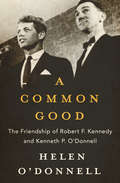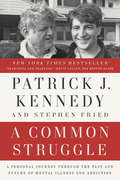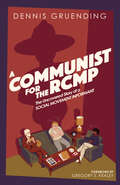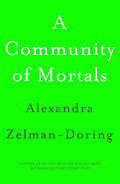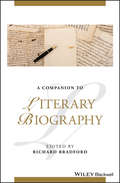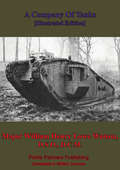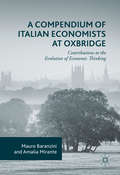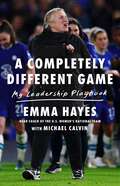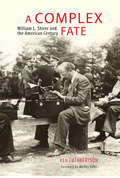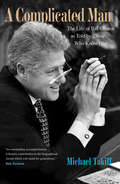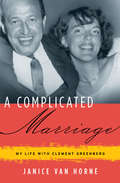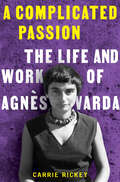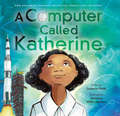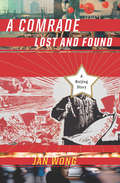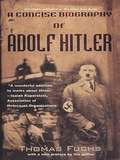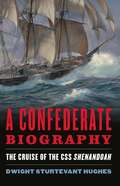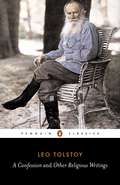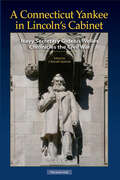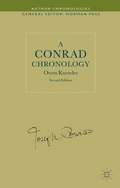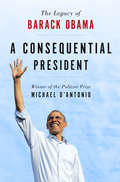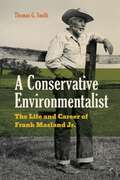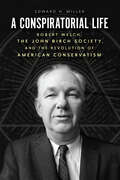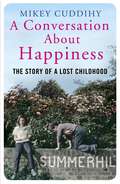- Table View
- List View
A Common Good: The Friendship of Robert F. Kennedy and Kenneth P. O'Donnell
by Helen O'DonnellAn illuminating account of the history-making friendship between RFK and the chief of staff to JFK—a bond built on shared ideals, but severed by tragedy. When they first met at Harvard in 1946, young Bobby Kennedy and Kenny O&’Donnell could not have imagined where their lives would take them. Teammates on both the football and debate teams, they formed a partnership that would sustain them through the years, from Robert Kennedy&’s tenure as attorney general to O&’Donnell&’s years as John F. Kennedy&’s chief of staff. Together they lived, worked, and struggled through some of the most pivotal moments of the twentieth century, including the assassination of JFK in Dallas. Their harmonious relationship was cut short only by Bobby&’s own tragic death. With full access to the Kennedy family archives, Helen O&’Donnell brings an inspiring personal and political alliance to life. With A Common Good, she amply fulfills the promise she made to her late father to honor and preserve his memories of Robert F. Kennedy for future generations. Kirkus Reviews hails A Common Good as &“a moving and intimate study of a unique friendship but also of the time and place, now long ago, in which this friendship formed and blossomed.&” O&’Donnell &“set out to write &‘a good book about two good men.&’ In this she has succeeded.&”
A Common Struggle: A Personal Journey Through the Past and Future of Mental Illness and Addiction
by Stephen Fried Patrick J. Kennedy**A New York Times Bestseller**Patrick J. Kennedy, the former congressman and youngest child of Senator Ted Kennedy, details his personal and political battle with mental illness and addiction, exploring mental health care's history in the country alongside his and every family's private struggles.On May 5, 2006, the New York Times ran two stories, "Patrick Kennedy Crashes Car into Capitol Barrier" and then, several hours later, "Patrick Kennedy Says He'll Seek Help for Addiction." It was the first time that the popular Rhode Island congressman had publicly disclosed his addiction to prescription painkillers, the true extent of his struggle with bipolar disorder and his plan to immediately seek treatment. That could have been the end of his career, but instead it was the beginning. Since then, Kennedy has become the nation's leading advocate for mental health and substance abuse care, research and policy both in and out of Congress. And ever since passing the landmark Mental Health Parity and Addiction Equity Act--and after the death of his father, leaving Congress--he has been changing the dialogue that surrounds all brain diseases.A Common Struggle weaves together Kennedy's private and professional narratives, echoing Kennedy's philosophy that for him, the personal is political and the political personal. Focusing on the years from his 'coming out' about suffering from bipolar disorder and addiction to the present day, the book examines Kennedy's journey toward recovery and reflects on Americans' propensity to treat mental illnesses as "family secrets."Beyond his own story, though, Kennedy creates a roadmap for equality in the mental health community, and outlines a bold plan for the future of mental health policy. Written with award-winning healthcare journalist and best-selling author Stephen Fried, A Common Struggle is both a cry for empathy and a call to action. From the Hardcover edition.
A Communist for the RCMP: The Uncovered Story of a Social Movement Informant
by Dennis GruendingIn 1941, the RCMP recruited Frank Hadesbeck, a Spanish Civil War veteran, as a paid informant to infiltrate the Communist Party. For decades, he informed not only upon communists, but also upon hundreds of other people who held progressive views. Hadesbeck’s “Watch Out” lists on behalf of the Security Service included labour activists, medical doctors, lawyers, university professors and students, journalists, Indigenous and progressive farm leaders, members of the clergy, and anyone involved in the peace and human rights movements. Defying every warning given to him by his handlers, Hadesbeck kept secret notes. Using these notes, author Dennis Gruending recounts how the RCMP spied upon thousands of Canadians. Hadesbeck’s life and career are in the past, but RCMP surveillance continues in new guises. As Canada’s petroleum industry doubles down on its extraction plans in the oil sands and elsewhere, the RCMP and other state agencies provide support, routinely branding Indigenous land defenders and their allies in the environmental movement as potential terrorists. They share information and tactics with petroleum industry “stakeholders” in what has been described as a “surveillance web” intended to suppress dissent. A Communist for the RCMP provides an inside account of Hadesbeck’s career and illustrates how the RCMP uses surveillance of activists to enforce the status quo.
A Community of Mortals
by Alexandra Zelman-DoringWhat is it like to have someone die in your arms? Can we return from the dead? And why has nobody heard of therapeutic hypothermia? Forced to come to terms with doctors pronouncing her husband ‘clinically dead’, Alexandra Zelman-Doring embarks on an exploration of what death means to us and how we might face it. Initally she is overwhelmed by the difficulty of accepting the loss of a loved one, and the anger, sadness and sense of isolation that it brings. But her suffering pushes her towards a life-store of reading, and here she finds words with which to contemplate death; from Turgenev on death as an ‘unanswerable reproach’ to Norbert Elias on the extraordinary collective will to endure it.Equally inspiring are the true stories of unlikely survivors: from a species of frog whose organs stop, frozen, throughout the winter, only to stir back to life in the spring, to Anna Bagenholm whose iced brain and body held out against all odds after a fatal accident. These incidents inform a development in medical science where cardiac arrest is treated with ‘therapeutic hypothermia’, in some cases allowing the body to last without oxygen just long enough for doctors to return the near-dead to life.
A Companion to Literary Biography (Blackwell Companions to Literature and Culture)
by Richard BradfordAn authoritative review of literary biography covering the seventeenth century to the twentieth century A Companion to Literary Biography offers a comprehensive account of literary biography spanning the history of the genre across three centuries. The editor – an esteemed literary biographer and noted expert in the field – has encouraged contributors to explore the theoretical and methodological questions raised by the writing of biographies of writers. The text examines how biographers have dealt with the lives of classic authors from Chaucer to contemporary figures such as Kingsley Amis. The Companion brings a new perspective on how literary biography enables the reader to deal with the relationship between the writer and their work. Literary biography is the most popular form of writing about writing, yet it has been largely neglected in the academic community. This volume bridges the gap between literary biography as a popular genre and its relevance for the academic study of literature. This important work: Allows the author of a biography to be treated as part of the process of interpretation and investigates biographical reading as an important aspect of criticism Examines the birth of literary biography at the close of the seventeenth century and considers its expansion through the eighteenth, nineteenth and twentieth centuries Addresses the status and writing of literary biography from numerous perspectives and with regard to various sources, methodologies and theories Reviews the ways in which literary biography has played a role in our perception of writers in the mainstream of the English canon from Chaucer to the present day Written for students at the undergraduate level, through postgraduate and doctoral levels, as well as academics, A Companion to Literary Biography illustrates and accounts for the importance of the literary biography as a vital element of criticism and as an index to our perception of literary history.
A Company Of Tanks [Illustrated Edition]
by Major William Henry Lowe Watson, D.S.O., D.C.M."Steel, mud, blood and courage on the Western FrontThis is a fine book because it is a superb first hand eye-witness account of British Tanks in action throughout the First World War. Without much preamble Watson launches the reader, in company with the author's brother officers, men and machines into the heart of the field of conflict on the 11th Corps forward line on the Western Front in the Autumn and Winter of 1916. From that point to the end of the book and the war itself the narrative takes us inexorably into the dark heart of war the tankers knew. Battles and battlefield experiences in their various phases (sometimes the book includes descriptions as expansive as three chapters each) are covered in engrossing detail. We join the author and the men we come to know as personalities, at First and Second Bullecourt, in much detail at Third Ypres and Cambrai before Amiens, the breaking of the Hindenburg Line and Second Le Cateau. This is a primary source work within a finite resource and as such is beyond value. Nevertheless, it is also a highly absorbing read to be relished by students of the period-professional and amateur alike. Available in soft cover and hard back with dust jacket for collectors."-Leonaur Print VersionAuthor -- Major William Henry Lowe Watson, D.S.O., D.C.M. (1891-1931)Text taken, whole and complete, from the edition published in Edinburgh; William Blackwood, 1920.Original Page Count - vii and 296 pagesMaps -- 8 sketch maps.
A Compendium of Italian Economists at Oxbridge: Contributions to the Evolution of Economic Thinking
by Mauro Baranzini Amalia MiranteThisstudy examines five decades of Italian economists who studied or researched atthe Universities of Oxford and Cambridge between the years 1950 and 2000. Providing a detailed list of Italian economists associated with Hicks, Harrod,Bacharach, Flemming, Mirrlees, Sen and other distinguished dons, the authorsexamine eleven research lines, including the Sraffa and the neo-Ricardianschool, the post-Keynesian school and the Stone's and Goodwin's schools. Baranzini and Mirante trace the influence of the schools in terms of 1) theirfundamental role in the evolution of economic thought; 2) their promotion offour key controversies (on the measurement of technical progress, on capitaltheory, on income distribution and on the inter-generational transmission ofwealth); 3) the counter-flow of Oxbridge scholars to academia in Italy, and 4)the invigoration of a third generation of Italian economists researching orteaching at Oxbridge today. A must-read for all those interested in the way Italian and British research has shaped the study and teaching of economics.
A Completely Different Game: My Leadership Playbook
by Emma HayesFrom the head coach of the United States Women&’s National Team and legendary coach of Chelsea FC comes a book of hard-won lessons for leading a team to success on and off the field. Few places will test your leadership skills more than the global soccer stage. For more than twenty years, Emma Hayes has led her teams to championship after championship, coaching her players through personal and professional setbacks, and becoming a powerful advocate for women in sports. Available for the first time in print, A Completely Different Game shares Hayes&’s inspirational, innately human approach to fulfilling the potential of those around her. Beginning with her upbringing in Camden and ending with her move to the US National Team, Hayes takes us through the events that shaped her and the critical leadership lessons she learned along the way. She also lays bare the difficulties that came with managing a women&’s sports team in an industry designed for and catered to men, and makes a clear, actionable, and urgent call for equity in sports. Generous, authoritative, and grounded in lived experience, A Completely Different Game will help you lead with heart, strength, and authenticity no matter what challenge you&’re facing.
A Complex Fate
by Ken Cuthbertson Morley SaferWilliam Shirer (1904-1993), a star foreign correspondent with the Chicago Tribune in the 1920s and '30s, was a prominent member of what one contemporary observer described as an extraordinary band of American journalists, "some with the Midwest hayseed still in their hair," who gave their North American audiences a visceral sense of how Europe was spiralling into chaos and war. In 1937, Shirer left print journalism and became the first of the now legendary "Murrow boys," working as an on-air partner to the iconic CBS broadcaster Edward R. Murrow. With Shirer reporting from inside Nazi Germany and Murrow from blitz-ravaged London, the pair built CBS's European news operation into the industry leader and, in the process, revolutionized broadcasting. But after the war ended, the Shirer-Murrow relationship shattered. Shirer lost his job and by 1950 found himself blacklisted as a supposed Communist sympathizer. After nearly a decade in the professional wilderness, he began work on The Rise and Fall of the Third Reich. Published in 1960, Shirer's magnum opus sold millions of copies and was hailed as the masterwork that would "ensure his reputation as long as humankind reads." Ken Cuthbertson's A Complex Fate is a thought-provoking, richly detailed biography of William Shirer. Written with the full cooperation of Shirer's family, and generously illustrated with photographs, it introduces a new generation of readers to a supremely talented, complex writer, while placing into historical context some of the pivotal media developments of our time.
A Complex Fate: William L. Shirer and the American Century (ISSN)
by Ken CuthbertsonWilliam Shirer (1904-1993), a star foreign correspondent with the Chicago Tribune in the 1920s and ’30s, was a prominent member of what one contemporary observer described as an extraordinary band of American journalists, "some with the Midwest hayseed still in their hair," who gave their North American audiences a visceral sense of how Europe was spiralling into chaos and war. In 1937, Shirer left print journalism and became the first of the now legendary "Murrow boys," working as an on-air partner to the iconic CBS broadcaster Edward R. Murrow. With Shirer reporting from inside Nazi Germany and Murrow from blitz-ravaged London, the pair built CBS’s European news operation into the industry leader and, in the process, revolutionized broadcasting. But after the war ended, the Shirer-Murrow relationship shattered. Shirer lost his job and by 1950 found himself blacklisted as a supposed Communist sympathizer. After nearly a decade in the professional wilderness, he began work on The Rise and Fall of the Third Reich. Published in 1960, Shirer's magnum opus sold millions of copies and was hailed as the masterwork that would "ensure his reputation as long as humankind reads." Ken Cuthbertson's A Complex Fate is a thought-provoking, richly detailed biography of William Shirer. Written with the full cooperation of Shirer’s family, and generously illustrated with photographs, it introduces a new generation of readers to a supremely talented, complex writer, while placing into historical context some of the pivotal media developments of our time.
A Complicated Man: The Life of Bill Clinton as Told by Those Who Know Him
by Michael Takiff&“An astonishing collection of 171 interviews with Clinton&’s friends, foes, admirers, and detractors as well as reporters and political analysts.&”—Booklist (starred review). Though Bill Clinton has been out of office since 2001, public fascination with him continues unabated. Many books about Clinton have been published in recent years, but shockingly, no single-volume biography covers the full scope of Clinton&’s life from the cradle to the present day, not even Clinton&’s own account, My Life. More troubling still, books on Clinton have tended to be highly polarized, casting the former president in an overly positive or negative light. In this, the first complete oral history of Clinton&’s life, historian Michael Takiff presents the first truly balanced book on one of our nation&’s most controversial and fascinating presidents. Through more than 150 chronologically arranged interviews with key figures—including Bob Dole, James Carville, and Tom Brokaw, among many others—A Complicated Man goes far beyond the well-worn party-line territory to capture the larger-than-life essence of Clinton the man. With the tremendous attention given to the Lewinsky scandal, it is easy to overlook the president&’s humble upbringing, as well as his many achievements at home and abroad: the longest economic boom in American history, a balanced budget, successful intervention in the Balkans, and a series of landmark, if controversial, free-trade agreements. Through the candid recollections of Takiff&’s many subjects, A Complicated Man leaves no area unexplored, revealing the most complete and unexpected portrait of our forty-second president published to date. &“Packed with fascinating personal perspective and testimony.&”—Nigel Hamilton, bestselling and award-winning author of American Caesars
A Complicated Marriage: My Life with Clement Greenberg
by Janice Van HorneIn 1955, Jenny Van Horne was a 21-year-old, naïve Bennington College graduate on her own for the first time in New York City when she met 46-year-old Clement Greenberg who, she is told, is "the most famous, the most important, art critic in the world" and soon finds herself swept into his world and the heady company of Hans Hofmann, Willem de Kooning, Franz Kline, David Smith, Helen Frankenthaler, among others. Seven months later, as a new bride, Jenny and Clem spend the summer in East Hampton near Jackson Pollock and Lee Krasner, and she feels even more keenly like an interloper in the inner circle of the art scene. A woman disowned by her anti-Semitic family for marrying a Jew, she would develop a deep, loving bond with Clem that would remain strong through years of an open marriage and separate residences.Jenny embodies the pivotal changes of each passing decade as she searches for worlds of her own. She moves from the tradition of wife and mother to rebellion and experimentation; diving into psychoanalysis; the theater world of OOB and the Actors' Studio; and succeeding in business. Throughout, A Complicated Marriage is grounded in honesty and the self-deprecating humor, grace, and appealing voice of its author.
A Complicated Passion: The Life and Work of Agnès Varda
by Carrie RickeyThe first major biography of the French filmmaker hailed by Martin Scorsese as “one of the Gods of cinema.” Over the course of her sixty-five-year career, the longest of any female filmmaker, Agnès Varda (1928–2019) wrote and directed some of the most acclaimed films of her era, from her tour de force Cléo from 5 to 7 (1962), a classic of modernist cinema, to the beloved documentary The Gleaners and I (2000) four decades later. She helped to define the French New Wave, inspired an entire generation of filmmakers, and was recognized with major awards at the Cannes, Berlin, and Venice Film Festivals, as well as an honorary Oscar at the Academy Awards. In this lively biography, former Philadelphia Inquirer film critic Carrie Rickey explores the “complicated passions” that informed Varda’s charmed life and indelible work. Rickey traces Varda’s three remarkable careers—as still photographer, as filmmaker, and as installation artist. She explains how Varda was a pioneer in blurring the lines between documentary and fiction, using the latest digital technology and carving a path for women in the movie industry. She demonstrates how Varda was years ahead of her time in addressing sexism, abortion, labor exploitation, immigrant rights, and race relations with candor and incisiveness. She makes clear Varda’s impact on contemporary figures like Ava DuVernay, Greta Gerwig, Barry Jenkins, the Safdie brothers, and Martin Scorsese, who called her one of the Gods of cinema. And she delves into Varda’s incredibly rich social life with figures such as Harrison Ford, Jean-Luc Godard, Jim Morrison, Susan Sontag, and Andy Warhol, and her nearly forty-year marriage to the celebrated director Jacques Demy. A Complicated Passion is the vibrant biography that Varda, regarded by many as the greatest female filmmaker of all time, has long deserved.
A Computer Called Katherine: How Katherine Johnson Helped Put America on the Moon
by Suzanne SladeThe inspiring true story of mathematician Katherine Johnson--made famous by the award-winning film Hidden Figures--who counted and computed her way to NASA and helped put a man on the moon!Katherine knew it was wrong that African Americans didn't have the same rights as others--as wrong as 5+5=12. She knew it was wrong that people thought women could only be teachers or nurses--as wrong as 10-5=3. And she proved everyone wrong by zooming ahead of her classmates, starting college at fifteen, and eventually joining NASA, where her calculations helped pioneer America's first manned flight into space, its first manned orbit of Earth, and the world's first trip to the moon!Award-winning author Suzanne Slade and debut artist Veronica Miller Jamison tell the story of a NASA "computer" in this smartly written, charmingly illustrated biography.
A Comrade Lost and Found: A Beijing Memoir
by Jan WongA &“suspenseful, elegantly written&” account of the author&’s return to China after thirty years to search for the woman she betrayed to the authorities (Publishers Weekly, starred review). In the early 1970s, at the height of the Cultural Revolution, Jan Wong traveled from Canada to Beijing University—where she would become one of only two Westerners permitted to study. One day a fellow student, Yin Luoyi, asked for her help getting to the United States. Wong, then a starry-eyed Maoist from Montreal, immediately reported her to the authorities, and shortly thereafter Yin disappeared. Thirty-three years later, hoping to make amends, Wong revisits the Chinese capital to search for the person who has haunted her conscience. At the very least, she wants to discover whether Yin survived. But Wong finds the new Beijing bewildering. Phone numbers, addresses, and even names change with startling frequency. In a society determined to bury the past, Yin Luoyi will be hard to find. As Wong traces her way from one former comrade to the next, she unearths not only the fate of the woman she betrayed but the strange and dramatic transformation of contemporary China. In this memoir, she tells how her journey rekindled all of her love for—and disillusionment with—her ancestral land. &“Gone is the semirural capital where the author&’s &‘revolutionary&’ course of study included bouts of hard labor and &‘self criticism&’ sessions. In its place are eight-lane expressways lit up &‘like Christmas trees,&’ shiny skyscrapers and the largest shopping mall in the world. Wong is a gifted storyteller, and hers is a deeply personal and richly detailed eyewitness account of China&’s journey to glossy modernity.&” —Publishers Weekly, starred review
A Concise Biography of Adolf Hitler
by Thomas Fuchs"Four Stars." --West Coast Review of Books "Fascinating reading." --Booklist "An engrossing book...excellent." --Oahu Sun Press
A Confederate Biography: The Cruise Of Css Shenandoah
by Dwight HughesBased primarily on the words of those who lived it, A Confederate Biography is a comprehensive narrative of the cruise of the CSS Shenandoah. More than a thrilling sea story, the journey provides a window of historical perspective on the Civil War. From October 1864 to November 1865, the officers of the Shenandoah carried the Confederacy and the conflict around the globe and to the ends of the earth through every extreme of sea and storm. Their observations looking back from the most remote and alien surroundings imaginable, along with viewpoints of those they encountered, illuminate the hearts and minds of contestants North and South. These Americans stood together in defense of their country as they understood it, pursuing a difficult and dangerous mission in which they succeeded spectacularly after it no longer mattered. Through their eyes, the potentially decisive international arena of the war, governed by complex maritime and trade law, comes alive. The neutrality, or lack thereof, of major European powers was a central concern to both sides. Shenandoah was smack in the middle of this diplomatic maelstrom and contributed to it. And within the navy, a generational clash arose between antebellum orthodoxy and a professional officer corps emerging from the new Naval Academy, rapid technological advances, contemporary social reforms, and the crucible of war. This difference was manifest between the captain of Shenandoah and his young lieutenants. The men they led, however, were a polyglot assemblage of merchant sailors of nearly every nation and color--including several Yankees and African Americans--operating within its own rigidly authoritarian and cramped society. Shenandoah herself was a magnificent vessel, the epitome of rich and ancient maritime heritages, but also a paradigm of dramatic transitions from the small wooden sailing navy to the second largest, most powerful, and technologically advanced fleet in the world. Her commerce raiding mission was a watery form of asymmetric warfare in the spirit of John Mosby, Bedford Forrest, and W. T. Sherman. It was arguably the most successful military effort of the Confederacy in terms of cost versus mission accomplished, but the strategic effectiveness of the strategy remains questionable. Shenandoah fired the last gun of the Civil War, set the land of the midnight sun aglow with flaming Yankee whalers, and, seven months after Appomattox, lowered the last Confederate banner. This is a biography of a ship and a cruise, and a microcosm of the Confederate-American experience.
A Confession and Other Religious Writings
by Leo TolstoyDescribing Tolstoy's crisis of depression and estrangement from the world, A Confession (1879) is an autobiographical work of exceptional emotional honesty. By the time he was fifty, Tolstoy had already written the novels that would assure him of literary immortality; he had a wife, a large estate and numerous children; he was 'a happy man' and in good health - yet life had lost its meaning. In this poignant confessional fragment, he records a period of his life when he began to turn away from fiction and aesthetics, and to search instead for 'a practical religion not promising future bliss, but giving bliss on earth'.
A Connecticut Yankee in Criminal Court
by Peter J. HeckThis is the second book in a series featuring Samuel Clemmens or Mark Twain, if you prefer, as the chief protagonist. Peter Heck began the series with Death on the Mississippi and here takes us to New Orleans where the scion of one of the great families is found poisoned. His cook is arrested and it is up to Clemens to prove him innocent before he is tried and convicted of a crime he did not commit.
A Connecticut Yankee in Lincoln's Cabinet: Navy Secretary Gideon Welles Chronicles the Civil War
by Gideon WellesThe U.S. Civil War through the eyes of a key member of President Abraham Lincoln’s cabinet.Gideon Welles, the Connecticut journalist-politician who served as Lincoln’s secretary of the navy, was not only an architect of Union victory but also a shrewd observer of people, issues, and events. Fortunately for posterity, he recorded many of his observations in his extensive diary. A Connecticut Yankee in Lincoln’s Cabinet brings together 250 of the most important and interesting excerpts from the diary, dealing with topics as varied as the issuance of the Emancipation Proclamation, the Marine Band’s concerts in Washington’s Lafayette Square, Lincoln’s sense of humor, rivalries among cabinet members, Welles’s often caustic opinions of prominent politicians and military leaders, demands for creation of a navy yard in his home state, the challenge of blockading 3,500 miles of Confederate coastline, the struggle against rebel commerce raiders, the battles of Antietam and Gettysburg, the Fort Pillow massacre of African American troops, and Lincoln’s assassination. Together, the excerpts provide a candid insider’s view of the Civil War as it unfolded, and an introduction provides the reader with context. Published by the Acorn Club.
A Conrad Chronology
by Owen KnowlesThis chronology is designed to provide a digest of Conrad's life as it develops from year to year. It is written as a series of diary or chronicle entries and thus caters for the reader who may wish to check a single fact. The main contents are supplemented by a Who's Who and indexes which provide easy access to a wider range of information.
A Consequential President: The Legacy of Barack Obama
by Michael D'AntonioBarack Obama was once a most unlikely candidate, but his successful campaign for the White House made him a worldwide sensation and a transformative figure even before he was inaugurated. Elected as the Iraq War and the Great Recession had discouraged millions of Americans, Obama made a promise of hope that revived the national spirit. Soon after he occupied the White House, Congress approved his economic-recovery act and his program to save the U.S. auto industry. Both worked better than any observer predicted, and together they powered a recovery that has seen growth return and unemployment reduced to below five percent. Today the American economy is again the most vibrant in the world and its recovery has far outpaced Western Europe's. Had he only saved the U.S. economy, Barack Obama would be considered a truly successful president. However, he has achieved so much more, against ferocious opposition---including some who challenged his claim to being an American citizen---that he can be counted as one of the most consequential presidents in history. With health care reform he ended a long-running crisis of escalating costs and inadequate access of treatment that threatened the well-being of 50 million people. His energy policies drove down the cost of power generated by the sun, the wind, and even fossil fuels. His efforts on climate change produced the first treaty to address global warming in a meaningful way---the Paris Agreement---and his diplomacy produced a dramatic reduction in the nuclear threat posed by Iran. Add the withdrawal of troops from Iraq, the normalization of relations with Cuba, and his “pivot” toward Asia, and Obama's successes abroad match those at home.In A Consequential President, Michael D'Antonio tallies President Obama’s long record of achievement, recalling both his major successes and less-noticed ones that nevertheless contribute to his legacy. The record includes Obama's role as a inspirational leader who was required to navigate race relations as the first black president and had to function in an atmosphere that included both racial acrimony from his critics and unfair expectations among supporters. In light of these conditions, Obama's greatest achievement came as he restored dignity and ethics to the office of the president, and serve as proof that he has delivered the hope and the change he promised eight years before.
A Conservative Environmentalist: The Life and Career of Frank Masland Jr.
by Thomas G. SmithA wealthy textile titan from Carlisle, Pennsylvania, Frank Masland Jr. was an ardent political conservative and an equally fervent conservationist who was well known and highly respected in the mid-twentieth-century environmental preservation community. This eye-opening biography charts Masland’s life work, telling the story of how he and fellow Republicans worked with Democrats to expand the national park system, preserve wild country, and protect the environment. Though a conservative conservationist appears to be a contradiction in terms today, this was not necessarily the case when Masland and his compatriots held sway. Conservatives, Masland insisted, had a duty to be good stewards of the earth for present and future generations, and they worked closely with members of both parties in Congress and nonpolitical conservation groups to produce landmark achievements. When conservatives turned against environmentalism during the Reagan presidency, Masland refused to join what historians have termed the “Republican reversal.” During his long life of nearly a hundred years, Masland used his voice, influence, experiences with nature, and considerable wealth to champion environmental causes at the national, state, and local levels. Engaging, informative, and at times eyebrow-raising, this portrait of a passionately anti-statist nature-loving Republican environmentalist documents the history of the twentieth-century conservation movement and reminds us of a time when conservative Republicans could work with liberal Democrats to protect the environment.
A Conspiratorial Life: Robert Welch, the John Birch Society, and the Revolution of American Conservatism
by Edward H. Miller“A cleverly written, finely textured, and badly needed study of a pivotal and too-often marginalized figure in the development of the modern American Right.” —The Journal of Southern History Though you may not know his name, Robert Welch (1899-1985)—founder of the John Birch Society—is easily one of the most significant architects of our current political moment. In A Conspiratorial Life, the first full-scale biography of Welch, Edward H. Miller delves deep into the life of an overlooked figure whose ideas nevertheless reshaped the American right.A child prodigy who entered college at age twelve, Welch became an unlikely candy magnate, founding the company that created Sugar Daddies, Junior Mints, and other famed confections. In 1958, he funneled his wealth into establishing the organization that would define his legacy and change the face of American politics: the John Birch Society. Though the group’s paranoiac right-wing nativism was dismissed by conservative thinkers like William F. Buckley, its ideas gradually moved from the far-right fringe into the mainstream. By exploring the development of Welch’s political worldview, A Conspiratorial Life shows how the John Birch Society’s rabid libertarianism—and its highly effective grassroots networking—became a profound, yet often ignored or derided influence on the modern Republican Party. Miller convincingly connects the accusatory conservatism of the midcentury John Birch Society to the inflammatory rhetoric of the Tea Party, the Trump administration, Q, and more. As this book makes clear, whether or not you know his name or what he accomplished, it’s hard to deny that we’re living in Robert Welch’s America.“Offers a good angle from which to appraise the fractured state of American conservatism.” —Financial Times
A Conversation About Happiness: The Story of a Lost Childhood
by Mikey CuddihyOrphaned at the age of nine, Mikey Cuddihy left the U.S. to board at an experimental British school. A vivid and intense memoir of coming of age amidst the unraveling social experiment of the late 1960s.When Mikey Cuddihy was orphaned at the age of nine, her life exploded. She and her siblings were sent from New York to board at experimental Summerhill School, in England, and abandoned there. The setting was idyllic, lessons were optional, pupils made the rules. Joan Baez visited and taught Mikey guitar. The late sixties were in full swing, but with total freedom came danger. Mikey navigated this strange world of permissiveness and neglect, forging an identity almost in defiance of it.
